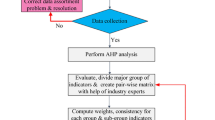Abstract
Lean Manufacturing is based on continuous improvement, aiming at optimizing the production system, eliminating waste and minimizing resources use. In this study, an in-depth analysis regarding the Lean performance evaluation methods present in the literature, as well as already implemented in the industry, is performed, focusing on the gaps of current models and needs for future ones. This paper proposes a method for Lean performance evaluation, following the robust theoretical approaches of existent assessment methods and keeping simplicity of application. The proposed method is divided into two distinct models: The Lean Assessment model and the Lean Maturity model. The Fuzzy logic is used in the models to attenuate the ambiguity and vagueness of the participants’ responses. The models’ validation was accomplished by comparing the method application in an industrial company with in loco Lean assessment.
Access this chapter
Tax calculation will be finalised at checkout
Purchases are for personal use only
Similar content being viewed by others
References
Womack JP, Jones DT, Roos D (1992) The machine that changed the world. Bus Horiz
Al Amin M (2013) A systematic approach for selecting lean strategies and assessing leanness in manufacturing organizations. Management
Susilawati A, Tan J, Bell D, Sarwar M (2015) Fuzzy logic based method to measure degree of lean activity in manufacturing industry. J Manuf Syst
Womack JP, Jones DT (1997) Lean thinking−Banish waste and create wealth in your corporation. J Oper Res Soc
Yazdani B (2003) Toyota production system: an integrated approach to Just-In-Time. Comput Integr Manuf Syst
Nesensohn C, Bryde D, Ochieng E, Fearon D, Hackett V (2014) Assessing lean construction maturity. In: 22nd annual conference of the international group for lean construction: understanding and improving project based production, IGLC 2014
Becker J, Niehaves B, Pöppelbuß J, Simons A (2010) Maturity models in IS research. In 18th European conference on information systems, ECIS 2010
Urban W (2015) The lean management maturity self-assessment tool based on organizational culture diagnosis. Procedia Soc Behav Sci
Cronemyr P, Danielsson M (2013) Process management 1-2-3—a maturity model and diagnostics tool. Total Qual Manag Bus Excell
Vinodh S, Balaji SR (2011) Fuzzy logic based leanness assessment and its decision support system. Int J Prod Res
Srinivasaraghavan J, Allada V (2006) Application of Mahalanobis distance as a lean assessment metric. Int J Adv Manuf Technol
Vinodh S, Vimal KEK (2012) Thirty criteria based leanness assessment using Fuzzy logic approach. Int J Adv Manuf Technol
Hosseini Nasab H, Aliheidari Bioki T, Khademi Zare H (2012) Finding a probabilistic approach to analyze lean manufacturing. J Clean Prod
Da Wan H, Frank Chen F (2008) A leanness measure of manufacturing systems for quantifying impacts of lean initiatives. Int J Prod Res
Zanjirchi SM, Tooranlo HS, Nejad LZ (2010) Measuring organizational leanness using Fuzzy approach. In: Proceedings of the 2010 international conference on industrial engineering and operations management
Gonçalves MT, Salonitis K (2017) Lean assessment tool for workstation design of assembly lines. Procedia CIRP
Bayou ME, de Korvin A (2008) Measuring the leanness of manufacturing systems-a case study of Ford Motor Company and General Motors. J Eng Technol Manag JET-M
Sânchez AM, Pérez MP (2001) Lean indicators and manufacturing strategies. Int J Oper Prod Manag
Behrouzi F, Wong KY (2011) Lean performance evaluation of manufacturing systems: a dynamic and innovative approach. Procedia Comput Sci
Doolen TL, Hacker ME (2005) A review of lean assessment in organizations: an exploratory study of lean practices by electronics manufacturers. J Manuf Syst
Vinodh S, Chintha SK (2011) Leanness assessment using multi-grade fuzzy approach. Int J Prod Res
Chan FTS, Qi HJ (2003) An innovative performance measurement method for supply chain management. Supply Chain Manag
Pakdil F, Leonard KM (2014) Criteria for a lean organisation: development of a lean assessment tool. Int J Prod Res
Soriano-Meier H, Forrester PL (2002) A model for evaluating the degree of leanness of manufacturing firms. Integr Manuf Syst
Barros M (2019) Lean performance evaluation: models and application. Instituto Superior Técnico, Universidade de Lisboa, Portugal
Acknowledgements
This work was supported by FCT, through IDMEC, under LAETA, project UID/EMS/50022/2019.
Authors gratefully acknowledge the funding of Project POCI-01-0247-FEDER-017637, cofinanced by Programa Operacional Competitividade e Internacionalização and Programa Operacional Regional de Lisboa, through Fundo Europeu de Desenvolvimento Regional (FEDER) and by National Funds through FCT—Fundação para a Ciência e Tecnologia.
Authors gratefully acknowledge the funding of Project POCI-01-0247-FEDER-024541, cofinanced by Programa Operacional Competitividade e Internacionalização and Programa Operacional Regional de Lisboa, through Fundo Europeu de Desenvolvimento Regional (FEDER) and by National Funds through FCT—Fundação para a Ciência e Tecnologia.
Author information
Authors and Affiliations
Corresponding author
Editor information
Editors and Affiliations
Rights and permissions
Copyright information
© 2020 Springer Nature Switzerland AG
About this paper
Cite this paper
Barros, M., Cecílio, H., Jorge, D., Peças, P. (2020). Lean Performance Evaluation: Models and Application. In: Rossi, M., Rossini, M., Terzi, S. (eds) Proceedings of the 6th European Lean Educator Conference. ELEC 2019. Lecture Notes in Networks and Systems, vol 122. Springer, Cham. https://doi.org/10.1007/978-3-030-41429-0_26
Download citation
DOI: https://doi.org/10.1007/978-3-030-41429-0_26
Published:
Publisher Name: Springer, Cham
Print ISBN: 978-3-030-41428-3
Online ISBN: 978-3-030-41429-0
eBook Packages: EngineeringEngineering (R0)




